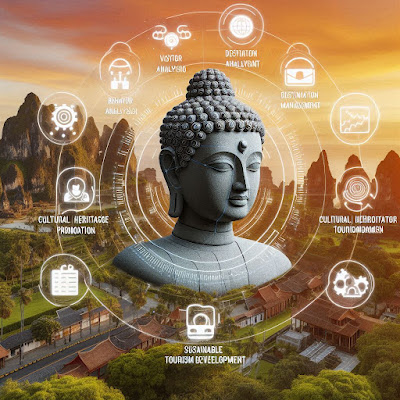Tourism plays a significant role in Australia's economy, cultural heritage, and global appeal. With the integration of artificial intelligence (AI) into Geographic Information Systems (GIS), tourism and destination management have entered a new era of innovation and efficiency. In this blog post, we'll explore how AI-driven GIS enhances tourism and destination management in Australia, focusing on visitor behavior analysis, tourism demand forecasting, cultural heritage tourism promotion, and sustainable tourism development.
Understanding Tourism and Destination Management with AI in GIS
Tourism and destination management involve strategic planning, marketing, and development initiatives to attract visitors, enhance visitor experiences, and promote sustainable tourism practices. AI-powered GIS technologies enhance destination management by leveraging spatial data, market insights, predictive analytics, and machine learning algorithms to understand visitor preferences, forecast tourism demand, preserve cultural heritage, and foster sustainable tourism development.
AI Applications in Tourism and Destination Management
- Visitor Behavior Analysis:AI algorithms analyse tourist movement patterns, spending habits, accommodation preferences, and activity choices to understand visitor behavior, tailor marketing strategies, and enhance visitor experiences, leading to increased visitor satisfaction and repeat visits.
- Tourism Demand Forecasting:AI-driven GIS models forecast tourism demand based on factors such as seasonality, economic trends, travel preferences, and demographic profiles, enabling destination managers to anticipate visitor flows, allocate resources efficiently, and plan for peak tourism periods.
- Cultural Heritage Tourism Promotion:AI-powered GIS promotes cultural heritage tourism by mapping heritage sites, historical landmarks, cultural events, and immersive experiences, creating engaging narratives, and marketing campaigns to attract cultural tourists and showcase Australia's rich heritage.
- Sustainable Tourism Development:AI-enabled sustainability assessments evaluate the environmental impacts of tourism activities, identify sustainable tourism practices, and develop strategies for minimizing carbon footprints, conserving natural resources, and preserving biodiversity in tourism destinations.
Benefits of AI in Tourism and Destination Management
- Enhanced Visitor Experiences:AI-driven destination management tools personalize visitor experiences, recommend tailored itineraries, and provide real-time information, enhancing visitor satisfaction, loyalty, and positive reviews.
- Data-Driven Decision-Making:AI-powered analytics provide data-driven insights, market trends analysis, and predictive modelling for informed decision-making in tourism marketing, product development, and destination planning.
- Improved Destination Marketing:AI-enhanced marketing strategies leverage geospatial data, social media analytics, and targeted campaigns to reach potential tourists, increase brand visibility, and attract niche markets such as cultural tourists, adventure seekers, and eco-travellers.
- Sustainability and Conservation Efforts:AI-enabled sustainability initiatives promote responsible tourism practices, support community engagement, and conserve natural and cultural heritage, contributing to long-term destination viability and resilience.
Challenges and Considerations
While AI offers significant benefits in tourism and destination management, challenges such as data privacy, visitor consent, algorithm bias, cultural sensitivity, and community engagement need to be addressed. This requires transparent AI models, ethical tourism practices, stakeholder collaboration, and community participation for sustainable and inclusive tourism development.
Conclusion: Transforming Tourism with AI-Driven Destination Management
In conclusion, AI-driven GIS is transforming tourism and destination management in Australia, offering new opportunities for enhancing visitor experiences, promoting sustainable tourism practices, and preserving cultural heritage. By leveraging AI technologies, destination managers, tourism operators, and stakeholders can unlock insights, optimize resources, and create memorable experiences for tourists while safeguarding Australia's natural and cultural treasures. Embracing AI in tourism and destination management isn't just about innovation—it's about shaping a sustainable and vibrant tourism industry that benefits visitors, communities, and the environment alike.






No comments:
Post a Comment